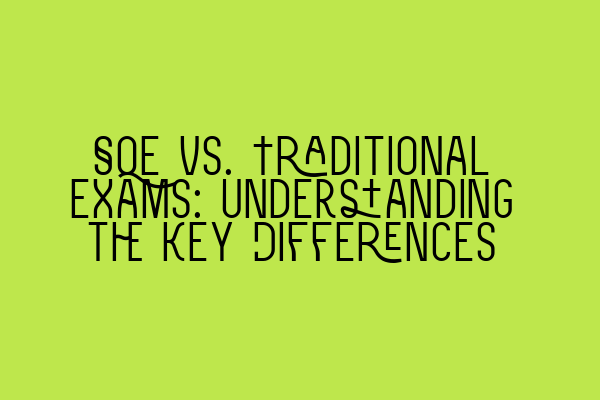SQE vs. Traditional Exams: Understanding the Key Differences
Aspiring solicitors often face the tremendous challenge of passing the Solicitors Qualifying Examination (SQE) to obtain the necessary qualifications for practising law in the UK. With the introduction of the SQE, there has been a shift away from the traditional exam format. In this blog post, we will delve into the key differences between the SQE and traditional exams, providing you with valuable insights to help you navigate this new examination landscape.
The Structure and Format
The structure and format of the SQE differ significantly from traditional exams. Instead of a series of written exams, the SQE consists of two stages: the SQE1 and SQE2. The SQE1 assesses candidates’ functioning legal knowledge through multiple-choice questions and written tasks, while the SQE2 evaluates their practical legal skills through a series of practical assessments.
Unlike traditional exams, the SQE emphasizes practical application of legal knowledge, mirroring the demands of real-life legal practice. This means that candidates must showcase their ability to apply legal principles to solve complex problems, rather than simply regurgitating information from textbooks.
Cost Considerations
Another significant difference between the SQE and traditional exams lies in the cost. Traditional exams often require candidates to pay substantial fees for each individual exam, which can quickly add up to a significant financial burden.
On the other hand, the SQE adopts a more cost-effective approach. Candidates are only required to pay for each stage of the examination, making it a more affordable option for aspiring solicitors. This new pricing structure aims to increase accessibility and diversity within the legal profession.
Flexibility and Pathways
When it comes to flexibility and pathways, the SQE offers candidates more options compared to traditional exams. With traditional exams, candidates typically have a limited number of attempts to pass each subject. Failing a subject may result in having to retake the entire exam.
In contrast, the SQE provides candidates with flexibility in their examination journey. Candidates can choose when to attempt each stage of the SQE and have unlimited attempts to pass. This flexibility allows aspiring solicitors to tailor their study and examination schedule to suit their individual circumstances, ultimately increasing their chances of success.
Moreover, the SQE recognizes the importance of experiential learning. Candidates who have accumulated relevant work experience may have the opportunity to progress directly to the SQE2, bypassing the SQE1 stage. This pathway is particularly advantageous for those who have already gained practical legal skills through work or other legal education programs.
SEO Integration and Related Articles
For more information on legal considerations in residential leases, essential insights for solicitors, you can check out our article on Legal Considerations in Residential Leases: Essential Insights for Solicitors.
If you’re interested in understanding planning permission and land use, key considerations for legal professionals, we recommend reading our article on Understanding Planning Permission and Land Use: Key Considerations for Legal Professionals.
To learn more about property practice in the UK, essential skills and knowledge for success, take a look at our article on Property Practice in the UK: Essential Skills and Knowledge for Success.
If you’re interested in lease extensions and enfranchisement, navigating complex legal procedures, our article on Lease Extensions and Enfranchisement: Navigating Complex Legal Procedures provides valuable insights.
For those dealing with joint ownership and navigating legal complexities for co-owners, we recommend reading our article on Joint Ownership: Navigating Legal Complexities for Co-Owners.
Conclusion
The transition from traditional exams to the SQE brings about significant differences that aspiring solicitors need to understand. From the structure and format to cost considerations, flexibility, and pathways, the SQE represents a new era in legal examinations. By embracing these changes and leveraging the resources available, candidates can approach the SQE with confidence and increase their chances of successfully qualifying as solicitors.

Leave a Reply